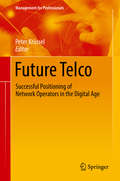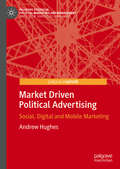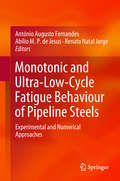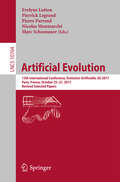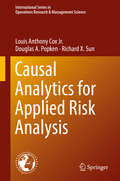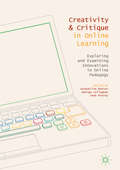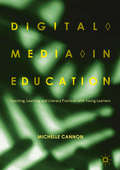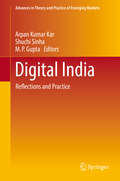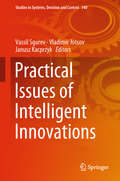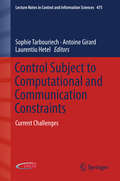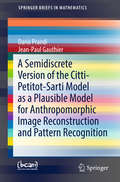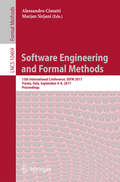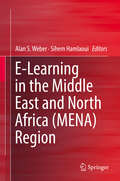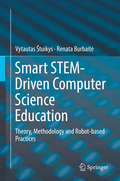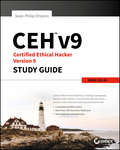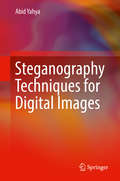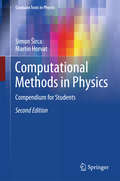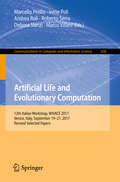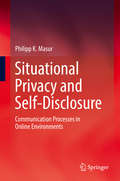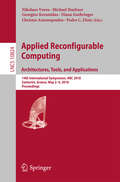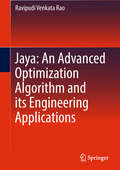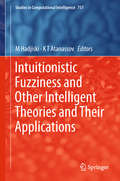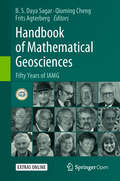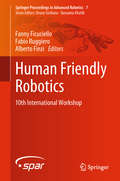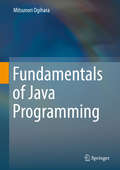- Table View
- List View
Future Telco: Successful Positioning of Network Operators in the Digital Age (Management for Professionals)
by Peter KrüsselThis book examines the extensive changes in markets, technologies and value chains that telecommunication companies are currently confronted with. It analyzes the crossroads they have reached and the choices that now need to be made – to be a bit pipe or a trendsetter of digitalization. Based on an analysis of the key challenges for telcos, the book derives future market scenarios and puts forward recommendations for how they can successfully position themselves. It proposes a framework based on seven “levers,” which addresses concrete measures in each step of the value chain, ranging from technology, IT and processes, to innovation, marketing and sales issues. The book discusses the current challenges and provides both general recommendations and concrete solutions. Respected experts illustrate innovative strategic and technical trends and provide insights gained in real-life transformation projects. Recent developments in the areas of regulation, product development, competition between over-the-top (OTT) providers and telcos, as well as technical innovations like 5G, SDN/NFV, LEO satellites and MEC are discussed. Accordingly, practitioners, managers and researchers alike will benefit from the book’s wealth of examples and up-to-date insights.
Market Driven Political Advertising: Social, Digital and Mobile Marketing (Palgrave Studies in Political Marketing and Management)
by Andrew HughesExploring the new era of political advertising beyond television and print, this book focuses on the mediums of the new millennia that are transforming campaigning and communications in political systems around the world. The author illustrates how the use of social, digital and mobile advertising enables political marketers to deliver messages more accurately and strengthen relationships between stakeholders such as voters, supporters and candidates. Examining digital and social media platforms such as Facebook, Twitter and YouTube, this innovative book analyses the changing political marketing landscape and proposes conceptual models for implementing more successful and effective political communications in the future.
Monotonic and Ultra-Low-Cycle Fatigue Behaviour of Pipeline Steels: Experimental and Numerical Approaches
by António Augusto Fernandes Abílio M.P. Jesus Renato Natal JorgeThis book covers the development of innovative computational methodologies for the simulation of steel material fracture under both monotonic and ultra-low-cycle fatigue. The main aspects are summarised as follows: i) Database of small and full-scale testing data covering the X52, X60, X65, X70 and X80 piping steel grades. Monotonic and ULCF tests of pipe components were performed (buckled and dented pipes, elbows and straight pipes). ii) New constitutive models for both monotonic and ULCF loading are proposed. Besides the Barcelona model, alternative approaches are presented such as the combined Bai-Wierzbicki-Ohata-Toyoda model. iii) Developed constitutive models are calibrated and validated using experimentally derived testing data. Guidelines for damage simulation are included. The book could be seen as a comprehensive repository of experimental results and numerical modeling on advanced methods dealing with Ultra Low Cycle Fatigue of Pipelines when subjected to high strain loading conditions.
Artificial Evolution: 6th International Conference, Evolution Artificielle, EA 2003, Marseilles, France, October 27-30 2003 (Lecture Notes in Computer Science #2936)
by Pierrick Legrand Nicolas Monmarché Evelyne Lutton Marc Schoenauer Pierre ParrendThis book constitutes the thoroughly refereed post-proceedings of the 6th International Conference on Artificial Evolution, EA 2003, held in Marseilles, France in October 2003.<P><P> The 32 revised full papers presented were carefully selected and improved during two rounds of reviewing and revision. The papers are organized in topical sections on theoretical issues, algorithmic issues, applications, implementation issues, genetic programming, coevolution and agent systems, artificial life, and cellular automata.
Causal Analytics for Applied Risk Analysis (International Series in Operations Research & Management Science #270)
by Louis Anthony Cox Jr. Douglas A. Popken Richard X. SunCausal analytics methods can revolutionize the use of data to make effective decisions by revealing how different choices affect probabilities of various outcomes. This book presents and illustrates models, algorithms, principles, and software for deriving causal models from data and for using them to optimize decisions with uncertain outcomes. It discusses how to describe and summarize situations; detect changes; evaluate effects of policies or interventions; learn what works best under different conditions; predict values of as-yet unobserved quantities from available data; and identify the most likely explanations for observed outcomes, including surprises and anomalies. The book resents practical techniques for causal modeling and analytics that practitioners can apply to improve understanding of how choices affect probabilities of consequences and, based on this understanding, to recommend choices that are more likely to accomplish their intended objectives.The book begins with a survey of modern analytics methods, focusing mainly on techniques useful for decision, risk, and policy analysis. Chapter 2 introduces free in-browser software, including the Causal Analytics Toolkit (CAT) software, to enable readers to perform the analyses described and to apply modern analytics methods easily to their own data sets. Chapters 3 through 11 show how to apply causal analytics and risk analytics to practical risk analysis challenges, mainly related to public and occupational health risks from pathogens in food or from pollutants in air. Chapters 12 through 15 turn to broader questions of how to improve risk management decision-making by individuals, groups, organizations, institutions, and multi-generation societies with different cultures and norms for cooperation. These chapters examine organizational learning, community resilience, societal risk management, and intergenerational collaboration and justice in managing risks.
Creativity and Critique in Online Learning: Exploring and Examining Innovations in Online Pedagogy
by Jacqueline Baxter George Callaghan Jean McAvoyThis book explores emerging practices in distance education that have been facilitated by the development of educational technology. The volume examines core themes in distance education including online education at scale, embodiment in online environments, connectivity in online education and the personalisation of learning experiences within online education. The first section of the book examines online teaching tools, and explores how they are being used to enhance and promote student learning. The second looks at some of the broader challenges encountered by online teachers and those responsible for designing online learning material. While this volume will be of significant interest to distance learning universities and colleges, it will also be a valuable resource to traditional Higher Education Institutions, who are increasingly searching for innovative ways to reach and teach their students. This edited collection will be of value to scholars of online education as well as practitioners and policy makers looking to enrich their notions of online pedagogy.
Digital Media in Education: Teaching, Learning and Literacy Practices with Young Learners
by Michelle CannonThis book argues for dynamic and relevant school experiences for primary and early secondary learners that embed digital media production. It proposes a vision of literacy that combines new technologies with multiple modes of meaning-making. Drawing on theories related to cultural studies, media literacy, anthropology, and creativity, the author explores learning strategies with digital media based on an empowering, values-driven framework. The book advances innovative teaching methods, critiquing educational ‘reforms’ that marginalise media and fail to engage with the complex tensions and textures of modern pedagogy. Positioning film and media-making as vital practices in schools that nurture the skills, dispositions and competencies of modern literacy, the model foregrounds connections between human agency, cognition, and creative practice. This innovative book will appeal to students and scholars of creativity, digital media production, primary education and literacy.
Digital India: Reflections and Practice (Advances in Theory and Practice of Emerging Markets #10595)
by Arpan Kumar Kar Shuchi Sinha M. P. GuptaThis book offers a multidisciplinary resource on digital government, while specifically focusing on its role within the emerging market of India. The Government of India (GoI) is concentrating on transforming India under the Digital India initiative. In order to do so, it has emphasized three core areas: (1) Computing infrastructure as a utility to every citizen; (2) Governance and services on demand; and (3) Digital empowerment of citizens. The chapters in this book address issues surrounding these areas, highlighting concepts such as knowledge societies, urban operations and logistics, issues in managing emergent Information Communication Technologies (ICTs), and also smart analytics for urbanization. The chapters contribute to the theory, practice and policy for a “Digital India.” The book captures lessons, knowledge, experiences (about challenges, drivers, antecedents, etc.) and best practices emerging from implementation of various projects. While the book is dedicated to a “Digital India,” this book can also be valuable resource for public administrators, government officials and researchers in other emerging markets and developing countries in Asia, Africa and Latin America where similar socio-political and economic conditions exist.
Practical Issues of Intelligent Innovations (Studies in Systems, Decision and Control #140)
by Vassil Sgurev Vladimir Jotsov Janusz KacprzykThis book presents recent advances in the field of intelligent systems. Composed of fourteen selected chapters, it covers a wide range of research that varies from applications in industrial data science to those in applied science. Today the word INNOVATION is more and more connected with the words INTELLIGENT and SECURITY, as such the book discusses the theory and applications of hot topics such as big data, education applications of robots with different levels of autonomy, knowledge-based modeling and control of complex dynamical systems, sign-based synthesis of behavior, security issues with intelligent systems, innovative intelligent control design, neuromorphic computation, data-driven classification, intelligent modeling and measurement innovations, multisensor data association, personal education assistants, a modern production architecture, study of peer review and scientometrics, intelligent research on bug report data, and clustering non-Gaussian data. The broad and varied research discussed represents the mainstream of contemporary intelligent innovations that are slowly but surely changing the world.
Control Subject to Computational and Communication Constraints: Current Challenges (Lecture Notes in Control and Information Sciences #475)
by Sophie Tarbouriech Antoine Girard Laurentiu HetelThis book provides a broad overview of the current problems, challenges and solutions in the field of control theory, communication theory and computational resources management. Recent results on dynamical systems, which open new opportunities for research and challenges to be addressed in the future, are proposed in the context of computational and communication constraints. In order to take into the account complex phenomena, such as nonlinearities, time-varying parameters and limited availability of information, the book proposes new approaches for open problems with both theoretical and practical significance. The contributors’ research is centred on robust stability and performance of control loops that are subject to computational and communication constraints. A particular focus is placed on the presence of constraints in communication and computation, which is a critical issue in networked control systems and cyber-physical systems. The contributions, which rely on the development of novel paradigms are provided are by leading experts in the field from all over the world, thus providing readers with the most accurate solutions for the constraints. Control subject to Computational and Communication Constraints highlights many problems encountered by control researchers, while also informing graduate students of the many interesting ideas at the frontier between control theory, information theory and computational theory. The book is also a useful point of reference for engineers and practitioners, and the survey chapters will assist instructors in lecture preparation.
A Semidiscrete Version of the Citti-Petitot-Sarti Model as a Plausible Model for Anthropomorphic Image Reconstruction and Pattern Recognition (SpringerBriefs in Mathematics)
by Dario Prandi Jean-Paul GauthierThis book proposes a semi-discrete version of the theory of Petitot and Citti-Sarti, leading to a left-invariant structure over the group SE(2,N), restricted to a finite number of rotations. This apparently very simple group is in fact quite atypical: it is maximally almost periodic, which leads to much simpler harmonic analysis compared to SE(2). Based upon this semi-discrete model, the authors improve on previous image-reconstruction algorithms and develop a pattern-recognition theory that also leads to very efficient algorithms in practice.
Software Engineering and Formal Methods: 15th International Conference, SEFM 2017, Trento, Italy, September 4–8, 2017, Proceedings (Lecture Notes in Computer Science #10469)
by Marjan Sirjani Alessandro CimattiThis book constitutes the refereed proceedings of the 15th International Conference on Software Engineering and Formal Methods, SEFM 2017, held in Trento, Italy, in September 2017. The 17 full papers and 6 short papers presented were carefully reviewed and selected from 102 submissions. The papers deal with a large range of topics in the following research areas: new frontiers in software architecture; software verification and testing; software development methods; application and technology transfer; security and safety; an d design principles.
E-Learning in the Middle East and North Africa (MENA) Region
by Alan S. Weber Sihem HamlaouiIn the last decade, due to factors of ICT infrastructural and broadband maturation, rising levels of educational attainment and computer literacy, and diversification strategies, e-learning has exploded in the Middle East and North Africa (MENA) region. However, significant barriers remain in the region’s e-learning development: lack of research on outcomes and effectiveness, paucity of Arabic language learning objects, monopolies and high cost of telecommunications, cultural taboos, accreditation, censorship, and teacher training.This unique volume is the first comprehensive effort to describe the history, development, and current state of e-learning in each of the 20 MENA countries from Algeria to Yemen. Each entry is expertly written by a specialist who is acutely familiar with the state of e-learning in their respective country, and concludes with a bibliography of key reports, peer-reviewed books and articles, and web resources.E-Learning in the Middle East and North Africa (MENA) proves itself as a vital compendium for a wide readership that includes academics and students, transnational program directors, international education experts, MENA government departments, commercial vendors and investors, and ICT development and regulatory agencies involved in e-learning in the Middle East.
Smart STEM-Driven Computer Science Education: Theory, Methodology and Robot-based Practices
by Vytautas Štuikys Renata BurbaitėAt the centre of the methodology used in this book is STEM learning variability space that includes STEM pedagogical variability, learners’ social variability, technological variability, CS content variability and interaction variability. To design smart components, firstly, the STEM learning variability space is defined for each component separately, and then model-driven approaches are applied. The theoretical basis includes feature-based modelling and model transformations at the top specification level and heterogeneous meta-programming techniques at the implementation level.Practice includes multiple case studies oriented for solving the task prototypes, taken from the real world, by educational robots. These case studies illustrate the process of gaining interdisciplinary knowledge pieces identified as S-knowledge, T-knowledge, E-knowledge, M-knowledge or integrated STEM knowledge and evaluate smart components from the pedagogical and technological perspectives based on data gathered from one real teaching setting. Smart STEM-Driven Computer Science Education: Theory, Methodology and Robot-based Practices outlines the overall capabilities of the proposed approach and also points out the drawbacks from the viewpoint of different actors, i.e. researchers, designers, teachers and learners.
CEH v9: Certified Ethical Hacker Version 9
by OriyanoThe ultimate preparation guide for the unique CEH exam. The CEH v9: Certified Ethical Hacker Version 9 Study Guide is your ideal companion for CEH v9 exam preparation. This comprehensive, in-depth review of CEH certification requirements is designed to help you internalize critical information using concise, to-the-point explanations and an easy-to-follow approach to the material. Covering all sections of the exam, the discussion highlights essential topics like intrusion detection, DDoS attacks, buffer overflows, and malware creation in detail, and puts the concepts into the context of real-world scenarios. Each chapter is mapped to the corresponding exam objective for easy reference, and the Exam Essentials feature helps you identify areas in need of further study. You also get access to online study tools including chapter review questions, full-length practice exams, hundreds of electronic flashcards, and a glossary of key terms to help you ensure full mastery of the exam material. The Certified Ethical Hacker is one-of-a-kind in the cybersecurity sphere, allowing you to delve into the mind of a hacker for a unique perspective into penetration testing. This guide is your ideal exam preparation resource, with specific coverage of all CEH objectives and plenty of practice material. Review all CEH v9 topics systematically Reinforce critical skills with hands-on exercises Learn how concepts apply in real-world scenarios Identify key proficiencies prior to the exam The CEH certification puts you in professional demand, and satisfies the Department of Defense's 8570 Directive for all Information Assurance government positions. Not only is it a highly-regarded credential, but it's also an expensive exam--making the stakes even higher on exam day. The CEH v9: Certified Ethical Hacker Version 9 Study Guide gives you the intense preparation you need to pass with flying colors.
Steganography Techniques for Digital Images
by Abid YahyaThis book covers newly developed and novel Steganography techniques and algorithms. The book outlines techniques to provide security to a variety of applications using Steganography, with the goal of both hindering an adversary from decoding a hidden message, and also preventing an adversary from suspecting the existence of covert communications. The book looks into applying these newly designed and improved algorithms to provide a new and efficient Steganographic system, called Characteristic Region-Based Image Steganography (CR-BIS). The algorithms combine both the robustness of the Speeded-Up Robust Features technique (SURF) and Discrete Wavelet Transform (DWT) to achieve characteristic region Steganography synchronization. The book also touches on how to avoid hiding data in the whole image by dynamically selecting characteristic regions for the process of embedding. Applies and discusses innovative techniques for hiding text in a digital image file or even using it as a key to the encryption;Provides a variety of methods to achieve characteristic region Steganography synchronization;Shows how Steganography improves upon cryptography by using obscurity features.
Computational Methods in Physics: Compendium for Students (Graduate Texts in Physics)
by Simon Širca Martin HorvatThis book is intended to help advanced undergraduate, graduate, and postdoctoral students in their daily work by offering them a compendium of numerical methods. The choice of methods pays significant attention to error estimates, stability and convergence issues, as well as optimization of program execution speeds. Numerous examples are given throughout the chapters, followed by comprehensive end-of-chapter problems with a more pronounced physics background, while less stress is given to the explanation of individual algorithms. The readers are encouraged to develop a certain amount of skepticism and scrutiny instead of blindly following readily available commercial tools. The second edition has been enriched by a chapter on inverse problems dealing with the solution of integral equations, inverse Sturm-Liouville problems, as well as retrospective and recovery problems for partial differential equations. The revised text now includes an introduction to sparse matrix methods, the solution of matrix equations, and pseudospectra of matrices; it discusses the sparse Fourier, non-uniform Fourier and discrete wavelet transformations, the basics of non-linear regression and the Kolmogorov-Smirnov test; it demonstrates the key concepts in solving stiff differential equations and the asymptotics of Sturm-Liouville eigenvalues and eigenfunctions. Among other updates, it also presents the techniques of state-space reconstruction, methods to calculate the matrix exponential, generate random permutations and compute stable derivatives.
Artificial Life and Evolutionary Computation: 12th Italian Workshop, WIVACE 2017, Venice, Italy, September 19-21, 2017, Revised Selected Papers (Communications In Computer And Information Science #830)
by Irene Poli Marcello Pelillo Marco Villani Roberto Serra Andrea Roli Debora SlanziThis book constitutes the revised selected papers of the 12th Italian Workshop on Advances in Artificial Life, Evolutionary Computation, WIVACE 2017, held in Venice, Italy, in September 2017.The 23 full papers presented were thoroughly reviewed and selected from 33 submissions. They cover the following topics: physical-chemical phenomena; biological systems; economy and society; complexity; optimization.
Situational Privacy and Self-Disclosure: Communication Processes in Online Environments
by Philipp K. MasurUsing both a theoretical argumentation and an empirical investigation, this book rationalizes the view that in order to understand people’s privacy perceptions and behaviors, a situational perspective needs to be adopted.To this end, the book is divided into three parts. Part I advances the theory of situational privacy and self-disclosure by discussing impacts of new information and communication technologies on traditional theories of privacy and self-disclosure. Based on five basic suppositions, it describes three major processes of the theory: pre-situational privacy regulations processes, situational privacy perception and self-disclosure processes, and post-situational evaluation processes. Next, Part II presents the application of the theory to smartphone-based communication. It first analyses how people choose certain communication environments on their smartphones, how they manipulate them, and how these external factors affect self-disclosure within these environments. It then details a multi-method study conducted to test the derived assumptions and discusses the obtained results. Part III reflects on the overall implications of the theory, summarizes the major findings and lastly considers possible extensions and perspectives on future research.Intended mainly for researchers in privacy and communication studies, the book offers privacy scholars a systematic review of both classic and contemporary theories of privacy and self-disclosure. At the same time, communication scholars benefit from an additional methodological discussion of the mobile experience sampling method, which provides an invaluable approach to measuring situational communication processes.
Applied Reconfigurable Computing. Architectures, Tools, and Applications: 14th International Symposium, Arc 2018, Santorini, Greece, May 2-4, 2018, Proceedings (Lecture Notes In Computer Science #10824)
by Pedro C. Diniz Diana Goehringer Michael Huebner Nikolaos Voros Georgios Keramidas Christos AntonopoulosThis book constitutes the proceedings of the 14th International Conference on Applied Reconfigurable Computing, ARC 2018, held in Santorini, Greece, in May 2018. <P><P> The 29 full papers and 22 short presented in this volume were carefully reviewed and selected from 78 submissions. In addition, the volume contains 9 contributions from research projects. The papers were organized in topical sections named: machine learning and neural networks; FPGA-based design and CGRA optimizations; applications and surveys; fault-tolerance, security and communication architectures; reconfigurable and adaptive architectures; design methods and fast prototyping; FPGA-based design and applications; and special session: research projects.
Jaya: An Advanced Engineering Optimization Algorithm And Its Applications
by Ravipudi Venkata RaoThis book introduces readers to the “Jaya” algorithm, an advanced optimization technique that can be applied to many physical and engineering systems. It describes the algorithm, discusses its differences with other advanced optimization techniques, and examines the applications of versions of the algorithm in mechanical, thermal, manufacturing, electrical, computer, civil and structural engineering.In real complex optimization problems, the number of parameters to be optimized can be very large and their influence on the goal function can be very complicated and nonlinear in character. Such problems cannot be solved using classical methods and advanced optimization methods need to be applied. The Jaya algorithm is an algorithm-specific parameter-less algorithm that builds on other advanced optimization techniques. The application of Jaya in several engineering disciplines is critically assessed and its success compared with other complex optimization techniques such as Genetic Algorithms (GA), Particle Swarm Optimization (PSO), Differential Evolution (DE), Artificial Bee Colony (ABC), and other recently developed algorithms.
Intuitionistic Fuzziness and Other Intelligent Theories and Their Applications (Studies in Computational Intelligence #757)
by M Hadjiski K T AtanassovThis book gathers extended versions of the best papers presented at the 8th IEEE conference on Intelligent Systems, held in Sofia, Bulgaria on September 4–6, 2016, which are mainly related to theoretical research in the area of intelligent systems. The main focus is on novel developments in fuzzy and intuitionistic fuzzy sets, the mathematical modelling tool of generalized nets and the newly defined method of intercriteria analysis. The papers reflect a broad and diverse team of authors, including many young researchers from Australia, Bulgaria, China, the Czech Republic, Iran, Mexico, Poland, Portugal, Slovakia, South Korea and the UK.
Handbook of Mathematical Geosciences: Fifty Years of IAMG
by B.S. Daya Sagar Qiuming Cheng Frits AgterbergThis Open Access handbook published at the IAMG's 50th anniversary, presents a compilation of invited path-breaking research contributions by award-winning geoscientists who have been instrumental in shaping the IAMG. It contains 45 chapters that are categorized broadly into five parts (i) theory, (ii) general applications, (iii) exploration and resource estimation, (iv) reviews, and (v) reminiscences covering related topics like mathematical geosciences, mathematical morphology, geostatistics, fractals and multifractals, spatial statistics, multipoint geostatistics, compositional data analysis, informatics, geocomputation, numerical methods, and chaos theory in the geosciences.
Human Friendly Robotics: 10th International Workshop (Springer Proceedings in Advanced Robotics #7)
by Fanny Ficuciello Fabio Ruggiero Alberto FinziThe International Workshop on Human-Friendly Robotics (HFR) is an annual meeting that brings together academic scientists, researchers and research scholars to exchange and share their experiences and research results on all aspects related to the introduction of robots into everyday life. HFR collects contributions on current developments of a new generation of human-friendly robots, i.e., safe and dependable machines, operating in the close vicinity to humans or directly interacting with them in a wide range of domains. The papers contained in the book describe the newest and most original achievements in the field of human-robot-interaction coming from the work and ideas of young researchers. The contributions cover a wide range of topics related to human-robot interaction, both physical and cognitive, including theories, methodologies, technologies, empirical and experimental studies.
Fundamentals of Java Programming
by Mitsunori OgiharaMaking extensive use of examples, this textbook on Java programming teaches the fundamental skills for getting started in a command-line environment. Meant to be used for a one-semester course to build solid foundations in Java, Fundamentals of Java Programming eschews second-semester content to concentrate on over 180 code examples and 250 exercises.Key object classes (String, Scanner, PrintStream, Arrays, and File) are included to get started in Java programming. The programs are explained with almost line-by-line descriptions, also with chapter-by-chapter coding exercises.Teaching resources include solutions to the exercises, as well as digital lecture slides.
